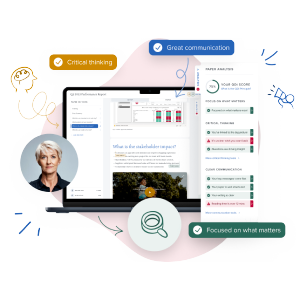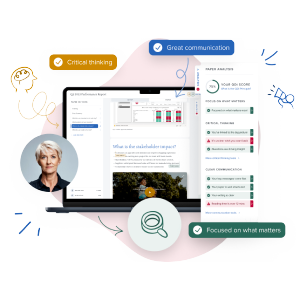Natasha Hughes, Practice Head at Board Intelligence and former policy adviser to the Prime Minister and Chancellor of the Exchequer, examines whether knowing your business is sufficient for producing high-quality reports.
The board pack is the most prized document of each organisation. Containing financial and strategic data about the health of the business, it outlines decisions that will set the direction of the firm. Subject matter experts within the business are tasked with writing reports for the pack and it’s often assumed that because report authors know their business, they are able to write effective reports. But is this the case?
What challenges do board report writers face?
A side effect of progressing into management often includes the responsibility for writing reports for the board. Whilst this provides the opportunity to demonstrate strategic awareness about your part of the business, it is hard to make the most of the opportunity when you don’t know what the board is looking for.
Whilst report authors are undoubtedly experts on their area of the business, they rarely have the experience to know what questions are on the board’s mind or have the skills to produce high-quality reports. And in the absence of knowing what ‘good reports’ look like, report authors tend to draw on essay writing techniques from school or university leading to papers that are long, indigestible and not tailored to the needs of a business.
Being a subject matter expert is a necessary, but not sufficient condition, for high-quality reporting. Research conducted by the Cambridge Judge Business School in 2016 found that training of report authors is a primary determinant of the quality of a board pack. In order to set report authors up to succeed, they need to be equipped with the skills to structure, write and present information in a way that gets to the heart of what matters to the board – and this is where training comes in.
What do best practice board reports look like?
Here are three tips for writing an effective board paper that you can use straight away:
1. Learn about your audience
Put yourself in the shoes of your board and consider what they already know about the topic and what questions they want answered. Considering these questions will help you write a report that provides the right level of detail and is tailored to your board.
2. Deliver insight
Many papers provide a general overview of a topic or an update on recent activity. Ensure your paper delivers insight by selecting relevant information for the board and bringing out the ‘so what’ or implication for your business.
3. Communicate effectively
Board members are short on time and need papers they can digest quickly and easily. Bring out the key message of your paper in an Executive Summary to highlight the purpose of the paper and your proposed response.
How can you learn more about effective report writing?
At Board Intelligence we provide a three-stage training programme to provide report authors with the skills to produce best practice reports:
1. Effective Reports
In this workshop report authors see what 'good' looks like in reporting and learn writing tips used by professionals.
2. Robust Reports
In this advanced workshop writers learn how to use a report structure to create an argument that is robust and stands up to scrutiny.
3. Data Visualisation
In this advanced workshop we focus on how to present data with insight and impact, and to make a distinction between analysis and reporting.
These workshops draw upon a mix of consulting, journalistic and business techniques, tailoring writing to the demands of the boardroom.
Feedback from our clients includes:
“This will have a major impact in guiding our company’s reporting in the future. Thank you for inspiring the team.” Simon Webster, Finance Director, Nisa Retail
“The training really added value and clarity within our business.” Win Chine, Deputy Company Secretary, Network Rail
99.1% of attendees rated our training very good or excellent.
If you would like to find out more about how Board Intelligence can help your report authors, please email Natasha using the button below.




